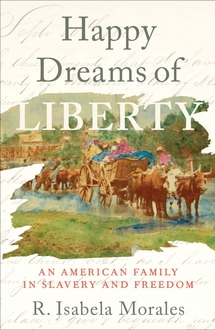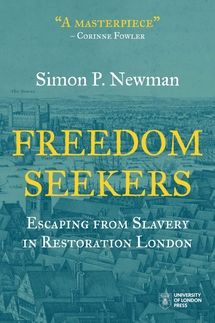Yale Announces 2023 Frederick Douglass Book Prize Winners
New Haven, Conn.— Yale University’s Gilder Lehrman Center for the Study of Slavery, Resistance, and Abolition today has announced the finalists for the twenty-fifth annual Frederick Douglass Book Prize, one of the most coveted awards for the study of slavery. The 2023 Prize will be shared by two scholars. The co-winners are R. Isabela Morales for “Happy Dreams of Liberty: An American Family in Slavery and Freedom” (Oxford University Press) and Simon P. Newman for “Freedom Seekers: Escaping from Slavery in Restoration London” (University of London Press).
This annual prize, jointly sponsored by the Gilder Lehrman Institute of American History in New York City and the Gilder Lehrman Center for the Study of Slavery, Resistance, and Abolition (GLC) at the MacMillan Center at Yale University, recognizes the best book written in English on the topics of slavery, resistance, or abolition published in the preceding year. The $25,000 prize, shared by the two winners, will be presented to Morales and Newman at an award ceremony sponsored by the Gilder Lehrman Institute at Trinity Church in New York City on February 28, 2024.
From a total of 78 submissions, the finalists were selected by a jury of scholars that included Kerry Ward (Chair), Associate Professor of History, Rice University; Trevor Burnard, Professor and Director of the Wilberforce Institute for the Study of Slavery and Emancipation, University of Hull; and Waldo E. Martin, Alexander F. & May T. Morrison Professor of American History & Citizenship, University of California, Berkeley.
Gilder Lehrman Center director David W. Blight commended the two books for the “breadth and depth of their scholarship and sensitive treatment of human-centered struggles for emancipation.” Jury chair Kerry Ward added that, in combination, the “compelling writing” of the winning books helps readers understand “the diversity of the experiences of slavery in different times and places,” with people centered at the heart of these stories.
In addition to Morales and Newman, the third finalist for the 2023 Frederick Douglass Book Prize was David Silkenat for “Scars on the Land: An Environmental History of Slavery in the American South” (Oxford University Press). The jury and review committee praised the book as an outstanding addition to the historiography of slavery. Jury member Trevor Burnard observed that the book is “deeply researched and expertly written,” and contributes “new dimensions to the history of antebellum slavery in the U.S. South” as well as pointing toward new directions of research.

In “Happy Dreams of Liberty,” R. Isabela Morales presents a finely crafted narrative of families across generations, revealing shifting meanings of race and gender in the United States and the resiliency and challenges faced by Black families, enslaved and free. The book “brings together complex and contradictory elements in a very skilled way,” Burnard observed. Morales’s book also paints fine-grained portraits of slaveholders in the antebellum U.S. South, emphasizing the ways that a “sense of absolute power went to their heads,” noted Edward Rugemer, review committee member and Professor of History at Yale University.

In “Freedom Seekers,” Simon Newman challenges our preconceptions of racial slavery as a product of colonialism by showing us how embedded it was in Restoration London. Blight commented that Newman’s “brilliant use of newspaper ads,” allows him to create moving stories about the lives and agency of enslaved African and South Asian people in the cosmopolitan, maritime world of seventeenth-century London. Gilder Lehrman Institute president James Basker added that Newman’s interdisciplinary approach provides an “outstanding model for research” for both college and high school students. Newman’s book “disrupts the narrative that England did not have a role in the ‘peculiar institution,’ ” noted Julian Braxton of the Winsor School, another review committee member.
The Frederick Douglass Book Prize was established by the Gilder Lehrman Institute of American History and the Gilder Lehrman Center in 1999 to stimulate scholarship in the field by honoring outstanding accomplishments. The award is named for Frederick Douglass (1818–1895), who escaped bondage to emerge as one of the great American abolitionists, reformers, writers, and orators of the nineteenth century.
The mission of the Gilder Lehrman Center for the Study of Slavery, Resistance, and Abolition (GLC) is to support academic excellence in the study of slavery and its enduring legacies, make this knowledge freely available to the public, and foster work toward social justice. Launched in November 1998 through generous contributions from philanthropists Richard Gilder and Lewis Lehrman, the GLC is affiliated with the Whitney and Betty MacMillan Center for International and Area Studies at Yale University. The Center is committed to creating and disseminating knowledge about slavery and its legacies across all borders and all time, with free public programs open to scholars, students, and the general community. The GLC supports research fellowships, the Frederick Douglass Book Prize, scholarly working groups, international conferences, publications, and educational workshops for secondary school teachers and students, domestic and international. For further information on events and programming, and to find out how you can support the continuing work of the GLC, visit https://glc.yale.edu/ or contact the Center by phone at (203) 432-3339 or e-mail at gilder.lehrman.center@yale.edu.
The Gilder Lehrman Institute of American History was founded in 1994 by Richard Gilder and Lewis E. Lehrman, visionaries and lifelong supporters of American history education. The Institute is the leading nonprofit organization dedicated to K–12 history education while also serving the general public. Its mission is to promote the knowledge and understanding of American history through educational programs and resources. As a 501(c)(3) nonprofit public charity, the Gilder Lehrman Institute is supported through the generosity of individuals, corporations, and foundations. The Institute’s programs have been recognized by awards from the White House, the National Endowment for the Humanities, the Organization of American Historians, the Council of Independent Colleges, and the Daughters of the American Revolution. For further information, visit gilderlehrman.org or call (646) 366-9666.